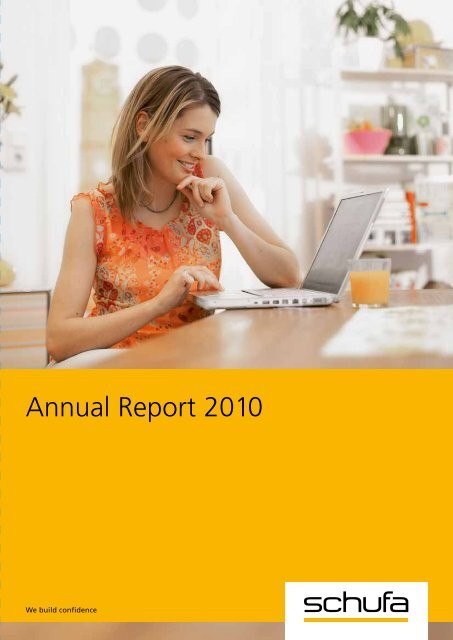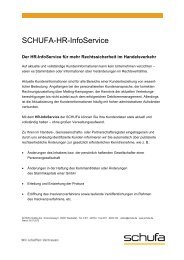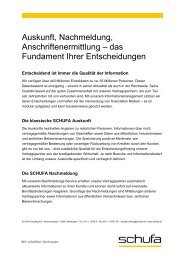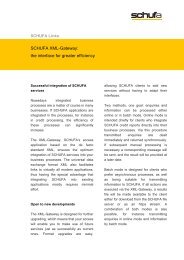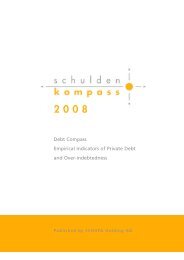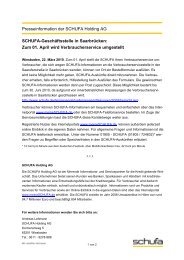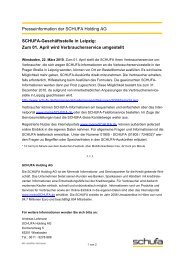2010 (PDF, 1.1 MB) - Schufa
2010 (PDF, 1.1 MB) - Schufa
2010 (PDF, 1.1 MB) - Schufa
You also want an ePaper? Increase the reach of your titles
YUMPU automatically turns print PDFs into web optimized ePapers that Google loves.
Annual Report <strong>2010</strong><br />
We build confidence
Contents<br />
2 Foreword from the Executive Board<br />
4 Advantages we offer<br />
6 Vital financial information<br />
10 Case study: What if …?<br />
12 New service for consumers<br />
14 Institution reports<br />
16 Prof Dr Winfried Hassemer, new SCHUFA Ombudsman<br />
18 The Consumer Advisory Board<br />
20 Topics and names in <strong>2010</strong><br />
22 Facts and figures<br />
24 Partners, subsidiaries, owners<br />
25 Executive Board and Supervisory Board<br />
27 Balance sheet<br />
28 We build confidence<br />
30 Imprint<br />
Annual Report <strong>2010</strong> 1
2 Forward from the Executive Board<br />
The Executive Board of SCHUFA Holding AG (from left to right):<br />
Peter Villa, Prof Dr Dieter Steinbauer, Dr Michael Freytag (Chairman of the Executive Board), Holger Severitt
Ladies and gentlemen,<br />
German consumers spent more than € 1.4 trillion in <strong>2010</strong>. This<br />
represents 58 per cent of Gross Domestic Product or, in absolute<br />
terms, a consumer-generated demand of € 4 billion a day. The<br />
constantly high level of demand over recent years helped to stabilise<br />
the economic situation during the crisis.<br />
Consumer loans are becoming ever more popular among<br />
consumers as an uncomplicated method of financing, in particular<br />
durable consumer goods. Consumer credit has displayed<br />
dramatic development over the past six decades since the foundation<br />
of the Federal Republic of Germany. The total volume<br />
of consumer loans has multiplied to € 225 billion since the 1950s.<br />
The consumer loan share of domestic loans has doubled<br />
since the 1960s. One third of consumers now use this method<br />
of payment.<br />
The role of consumer loans as economic growth drivers is becoming<br />
more important, especially considering that the average<br />
value of new loans amounted to € 7,099 in the previous year.<br />
With ever-increasing frequency, Germans are turning to creditfinancing<br />
for the purchase of larger, longer-lasting goods such<br />
as automobiles, electronics and furniture.<br />
Every day, SCHUFA receives around 250,000 requests for information.<br />
The system works: 97.5 per cent of all consumer loans<br />
are repaid according to contract. No other information provider<br />
supports the economy to such an extent by providing positive<br />
information about consumers. SCHUFA currently has 479 million<br />
records on 66.2 million individuals. More than 91 per cent of<br />
these records contain positive data only.<br />
Yours sincerely,<br />
Forward from the Executive Board 3<br />
SCHUFA business reports allow private individuals to obtain information<br />
on a company’s credit standing. They become informed<br />
participants in the economy and can get a precise idea of a business’s<br />
creditworthiness before entering into a business relationship<br />
with the company of their choosing. With its database of<br />
business data, SCHUFA, for the first time, has information on all<br />
legal entities as well as private individuals in Germany.<br />
The B2B compact report for companies provides immediate<br />
access to creditworthiness information, even on the particularly<br />
large number of smaller businesses in Germany. It provides an<br />
informed basis for the provision of loans and thus the continued<br />
business development of these companies. The information<br />
makes it easier for lenders, in the course of a cost appropriateness<br />
process, to enter into new business relationships. For lenders<br />
and borrowers, information turns into trust, which in turn<br />
turns into growth opportunities.<br />
The past financial year saw an important institutional change.<br />
Prof Dr Winfried Hassemer took on the position of Ombudsman<br />
as of 1 July <strong>2010</strong>. He was the Vice-President of the Federal Constitutional<br />
Court of Germany and Data Protection Commissioner<br />
in Hesse. As SCHUFA Ombudsman, he is now responsible for<br />
representing consumer interests. He reports to SCHUFA’s Consumer<br />
Advisory Board, whose 15 members from various fields,<br />
such as science, politics, administration and associations, exchange<br />
opinions with us on fundamental issues.<br />
We would like to particularly thank our business partners, employees<br />
and shareholders for their loyalty to SCHUFA over the<br />
years. They support SCHUFA’s successful path and guarantee<br />
the greatest possible benefits for everyone involved.<br />
Dr Michael Freytag Holger Severitt Prof Dr Dieter Steinbauer Peter Villa
4 Advantages we offer<br />
Advantages we offer: SCHUFA has over one million private customers, who can<br />
access their data on our consumer portal: www.meineSCHUFA.de. Since <strong>2010</strong>,<br />
SCHUFA business reports have, for the first time, been available to portal users.<br />
Private individuals can use them to get a more exact picture of a company’s creditworthiness<br />
before entering into a business relationship with them. Before building<br />
a home, for example, individuals can find a lot of helpful information about companies<br />
they plan to give orders to.
Advantages we offer 5
6 Advantages we offer<br />
Vital financial information<br />
The benefits to consumers and companies increase as<br />
loan applications and decisions become faster and more<br />
reliable. They benefit from the decades of expertise<br />
that SCHUFA has gained in the handling of risks that<br />
occur when taking out or granting loans.<br />
Lenders and borrowers should therefore have a common interest<br />
in keeping their creditworthiness information as complete<br />
and up to date as possible. The reliability and stability of this<br />
information is an important factor in business decisions and<br />
the cornerstone of a modern, credit-based economy. With its<br />
6,000 partners, SCHUFA provides a unique basis to facilitate<br />
this process: 479 million records on 66.2 million people, B2B<br />
partners and business customers.<br />
Compact SCHUFA report<br />
With the compact SCHUFA report, a first in the market when<br />
introduced in <strong>2010</strong>, the B2B service range was supplemented with<br />
a critical facility: for the first time, companies could access compact<br />
data on the creditworthiness of customers, prospective customers<br />
or business partners. This is of particular importance due<br />
to the fact that the solvency of a company may depend heavily<br />
on the private creditworthiness of the owners or shareholders.<br />
A company is only as reliable as the people who run it. It is important<br />
to know who the decision-makers are in the company in<br />
order to build confidence for a beneficial cooperation. If information<br />
is available to SCHUFA from public sources, such as from<br />
affidavits or personal bankruptcies, information on management<br />
is also incorporated into the company’s creditworthiness assessment,<br />
as medium-sized enterprises are characterised by the<br />
integration of the operation and the owner as well as the unity<br />
of the economic existence of the owner and the existence of<br />
the company.<br />
For smaller companies, the credit quality of the people involved<br />
has a significant impact on the company’s credit rating, as, of<br />
the 1.7 million companies in Germany, around 75 per cent of<br />
them are small businesses, i. e. no more than nine staff and<br />
an annual turnover of € 2 million or less. 1 This means that the<br />
1 Federal Statistical Office, as of: August 2008<br />
medium-sized and small company is the predominant type of<br />
company in the German economy. Consequently, fast, comprehensive<br />
and reliable economic information is of particular importance<br />
to this medium-sized segment.<br />
SCHUFA’s compact report links the creditworthiness data of private<br />
individuals from the SCHUFA database with company data.<br />
By combining both data sources, SCHUFA has access to a total<br />
of just under five million self-employed people, small businesses<br />
and freelancers as well as all companies listed in the commercial<br />
register. This means that SCHUFA is able to provide information on<br />
all potential borrowers in Germany, be they individuals or entities.<br />
The contents of the compact SCHUFA report<br />
• Master data<br />
• Creditworthiness information, including creditworthiness index<br />
• Bank account details<br />
• Commercial register information (depending on the legal form)<br />
• Business figures<br />
• Sector information<br />
• Functionaries and their involvements<br />
Negative indicators – such as non-contract-compliant payment<br />
behaviour – concerning company representatives are also included<br />
in the company’s creditworthiness rating. This enables a<br />
more targeted credit rating, especially in the case of small businesses.<br />
The creditworthiness index in the compact SCHUFA report<br />
gives an indication of the probability of company failure.<br />
Besides the daily updated creditworthiness index, the average<br />
creditworthiness index of the previous 90 days shows the<br />
trend in the development of the company’s solvency.<br />
The creditworthiness index includes but is not limited to<br />
the following data<br />
• Balance sheets and key figures<br />
• Past payment behaviour<br />
• Legal form<br />
• First management level<br />
• Sectors<br />
• Activities/Stability
On this basis, a credit-limit recommendation is also possible,<br />
which indicates objectively the maximum amount of goods and/<br />
or services loan that can be granted,<br />
The multi-stage professional address determination of<br />
private individuals<br />
Banks, savings banks, insurance companies, telecommunication<br />
companies, retailers and e-commerce companies provide creditrelated<br />
data under contract to SCHUFA. Without SCHUFA, which<br />
provides relevant information in seconds, partners would face<br />
additional processing costs. This becomes even more important,<br />
the more mobile the society and customer groups become.<br />
Almost every company is familiar with this problem: customers<br />
move home, address records become outdated. There is a need<br />
for efficient update options. SCHUFA has therefore introduced<br />
two innovative products this reporting year, AdressAktualiserung<br />
Plus and AdressAktualisierung Plus EMA, which prevent post<br />
from being returned when customers move house or address<br />
details are outdated.<br />
Advantages we offer 7<br />
‘Consumers are increasingly turning to consumer product financing.<br />
More than one third of consumer households use loans for private consumer<br />
purchases, from cars to mobile phones. According to a survey<br />
by GfK Financial Market Research, which the German Credit Bank Association<br />
commissions on an annual basis, consumers financed more retail<br />
goods in particular in <strong>2010</strong>. Nearly one in ten consumers completed an<br />
instalment loan for these purchases. This represents an increase of two<br />
percentage points compared to the previous year. Loans were taken out<br />
primarily for consumer electronics, IT, furniture and kitchens. The willingness<br />
to pay by credit at the point of sale continues to increase. Nearly 40<br />
per cent of households intending to buy a kitchen or furniture in the<br />
next two years would also finance this purchase. The German Credit Bank<br />
Association is therefore optimistic that private borrowing will increase.’<br />
Peter Wacket, Managing Director of the Bankenfachverband e. V.<br />
With AdressAktualisierung Plus and AdressAktualisierung<br />
Plus EMA, addresses are compared in a multi-stage process<br />
with the current SCHUFA databases and, if necessary, with<br />
the Deutsche Post’s (German postal service) databases, and<br />
then validated using a delivery check. As soon as the vali-<br />
dation process and delivery check have been completed successfully,<br />
each address is then delivered immediately to the<br />
partners concerned.<br />
The advantages of reports<br />
Using SCHUFA’s products, customer managers are able to<br />
take advantage of special decision-making tools when carrying<br />
out creditworthiness checks and granting loans to new and<br />
existing clients.<br />
Speed and high data quality are particularly important when<br />
making initial business contacts with new customers. Since<br />
requesting and checking individual records is time-consuming<br />
both for customers and partners, integrating SCHUFA information<br />
is in the interest of consumers and lending companies.
8 Advantages we offer<br />
Without the SCHUFA report, loan applications from so-called<br />
risk customers would be more likely to be turned down, or the<br />
proportion of high-risk loans in the portfolio would increase.<br />
Losses of growth and earnings and dissatisfaction of the customer<br />
base would be the inevitable consequences.<br />
Credit bureaus, which operate between borrower and lend-<br />
er independently and on a competitively neutral basis, build<br />
confidence. In the reporting year, SCHUFA issued over 100<br />
million reports to partners. In addition, more than 739,000<br />
reports were issued to private customers.<br />
In order to facilitate this reliable exchange of information,<br />
SCHUFA invests considerable funds in IT infrastructure, in providing<br />
resources for record processing and consumer services.<br />
This infrastructure and SCHUFA’s more than 750 employees<br />
guarantee fast and direct communication channels to partners<br />
and consumers.<br />
More and more consumers expect to be able to buy their<br />
retail purchases on credit. One in three consumer households<br />
now pay for consumer goods not in cash but instead via<br />
credit financing.<br />
SCHUFA’s consumer products<br />
• Credit reports<br />
• Monitoring reports<br />
• Identity products<br />
• Address products<br />
• Information products<br />
• Score<br />
SCHUFA’s corporate products<br />
• Business reports<br />
• Analysis products<br />
• Data management<br />
• Commercial register products<br />
• Score<br />
The costs of procuring the information would increase considerably<br />
if there were no service provider such as SCHUFA delivering<br />
the creditworthiness information relevant for lending quickly<br />
and reliably. Particularly in the case of borrowers, who are less tied<br />
to particular locations, either lenders would have to collect more<br />
detailed information or borrowers would have to provide more<br />
information. If neither action takes place, the risks increase as<br />
well as the costs for consumers.<br />
Stable private credit market<br />
The development of private lending during the financial crisis<br />
shows that SCHUFA makes an important contribution towards<br />
enabling unproblematic lending and furthermore that it plays<br />
a key role in stabilising the credit market in Germany.<br />
The German consumer has proven to be a reliable and increasingly<br />
important factor in the German domestic market. In this<br />
regard, consumer loans have doubled their share of domestic<br />
loans to twelve per cent since the 1960s. Although ten per cent<br />
more instalment loans were granted from 2008 to <strong>2010</strong>, the<br />
proportion of loans executed in accordance with contract, at<br />
97.5 per cent for <strong>2010</strong>, only fell by 0.1 percentage points compared<br />
to the previous year. This figure is therefore at the same<br />
positive level as 2009. This shows that interaction between the<br />
lending industry, consumers and credit bureaus functions excellently<br />
even in turbulent economic times and ensures stable relationships<br />
and, as a result, planning security for the economy<br />
over the long term.<br />
The reason for the reliable payment of instalments by borrowers<br />
is the robust German employment market. However, careful,<br />
thorough checking of loan applications by banks also plays an<br />
important role. Credit-financed private consumption safeguarded<br />
by reliable information thus proves itself to be an important<br />
pillar for the economy.<br />
The value of positive information<br />
For more than 91 per cent of people, the information stored<br />
in SCHUFA’s database is exclusively positive, and it documents<br />
the contract-compliant behaviour of consumers. With positive<br />
information, lenders can assess potential borrowers’ creditworthiness<br />
much more precisely than they can in a data landscape<br />
based exclusively on negative information, as positive informa-
tion gives lenders a better overview of borrowers’ overall financial<br />
situation and allows them to help avoid over-indebtedness risks.<br />
An international study has shown that the introduction of<br />
positive information by credit bureaus allowed lenders to fulfil<br />
considerably more loan applications from credit applicants.<br />
Borrowers also benefit by providing positive information on their<br />
business activities to credit bureaus or partners of credit bureaus,<br />
and thereby bolster their financial reputation.<br />
Advantages we offer 9<br />
‘The European domestic market for private customers is still a long way off.<br />
Private banks in Germany support the European policy attempts to grad -<br />
ually create an integrated retail-banking market in Europe. This would increase<br />
competition in national markets and give consumers a larger product<br />
range at more favourable conditions. In order to bring about these advantages,<br />
the European Commission has initiated several measures, such as<br />
the “Access to basic payment accounts” and the “Planned regulations on<br />
responsible granting of mortgages”. Both in the case of opening accounts<br />
as well as the creditworthiness assessment in the context of granting mortgages,<br />
SCHUFA’s services are playing an increasingly important role – in<br />
the future this will also apply to cross-border business.’<br />
Dr Ibrahim Karasu, Member of the Management Board, Bundesverband deutscher Banken<br />
(Association of German Banks)
10 Advantages we offer<br />
Case study: What if …?<br />
Kreissparkasse Esslingen-Nürtingen calculated the value<br />
added from its cooperation with SCHUFA. Our ‘credit<br />
report’ and ‘monitoring report’ products were put to<br />
the test in terms of lending and creditworthiness assessments<br />
within new and existing customer business.<br />
What if there were no SCHUFA? The Esslingen-Nürtingen regional<br />
savings bank (Kreissparkasse) addressed this question in<br />
detail. After migrating to Finanz Informatik’s (the data centre<br />
for German savings banks) OSPlus, the regional savings bank<br />
wanted to investigate the added value of SCHUFA’s ‘credit report’<br />
and ‘monitoring report’ products. The results up front:<br />
each euro invested in SCHUFA services saved approx. € 13 in<br />
company spending.<br />
Reducing process costs with SCHUFA<br />
To take into account the various scenarios, the first step was<br />
to determine the process costs if the SCHUFA credit report were<br />
not included. This would have delayed the final decision on a<br />
loan by seven to ten days including receiving the bank report<br />
by post. The immediate consequence: customers become less<br />
accessible for further consultation and financial discussions as a<br />
result of the delayed loan decision. The cross-selling business<br />
would also be significantly impeded. Furthermore, the situation<br />
Initial situation: Management and optimisation of business<br />
processes at the Esslingen-Nürtingen regional savings bank<br />
Goal: Increased revenue for products offered to new and<br />
existing customers<br />
Solution: Determination of information and reporting costs.<br />
Simulation of the costs that result when SCHUFA’s ‘credit<br />
reports’ and ‘monitoring reports’ are not involved<br />
Result: Cooperation with SCHUFA contributes to the reduction<br />
of risk as well as to time and cost savings. One euro<br />
spent on SCHUFA results in savings of € 13 at the regional<br />
savings bank<br />
would result in additional personnel costs: if 60 minutes are<br />
allowed for the manual processing of each loan application,<br />
2,000 loan applications per year would result in additional<br />
annual personnel costs of € 50,000.<br />
Also, if it is assumed that ten per cent of the customers would<br />
go to a competitor due to the long waiting periods, internal calculations<br />
at the regional savings bank show that this would<br />
burden revenue by an additional € 83,000 per year. In addition,<br />
it could be expected that interest rates would be considerably<br />
affected and would increase as a result of a deficit of information<br />
and increased risk. If an estimated five per cent of customers<br />
then chose another bank, this would result in an additional annual<br />
earnings loss of € 40,000. Finally, the regional savings<br />
bank simulated the potential loss of customers for instalment<br />
loans and the closing of savings accounts.<br />
The scenarios demonstrate: SCHUFA credit reports reduce manual<br />
work to a minimum. At 60 minutes per loan application, the<br />
time savings alone result in cost reductions of at least € 50,000<br />
annually. Added to this is the significant value added from optimised<br />
customer service with quick response times and more<br />
time for consultation.<br />
Customer service in focus<br />
In addition to the SCHUFA credit report, SCHUFA monitoring<br />
reports also play an important role in loan decisions. The monitoring<br />
report service at SCHUFA provides contractual partners<br />
with automatically updated information about their clients so<br />
that they can immediately react to any potential change in<br />
creditworthiness.<br />
SCHUFA monitoring reports are based on information provided<br />
by our contractual partners and information from public registers<br />
or official notifications. Thanks to SCHUFA monitoring reports<br />
and their storage in the OSP-integrated partner database,<br />
the regional savings bank is kept up to date and is thus flexible<br />
and independent. In addition, address changes reported by<br />
SCHUFA give information as to the whereabouts of customers<br />
with unknown addresses.<br />
Without SCHUFA’s monitoring reports, financial advisors would<br />
have to take on the time-consuming task of going through
debtor listings. Recovering the information in public registries –<br />
once or twice a month – would result in about an additional<br />
day’s work. Added to this would then be the setting up and<br />
maintenance of an in-house system for the monitoring of<br />
accounts and payment transactions, which would mean several<br />
months’ work for the project team and generate costs of approximately<br />
€ 50,000 per year. And since updates to public registries<br />
are, for the most part, not made when the customer<br />
requests a loan, customers themselves would have to regularly<br />
make updates. Frequent requests for information from financial<br />
advisors would therefore be more than just time-consuming;<br />
they would work against ideal customer service.<br />
Making good use of SCHUFA information<br />
In order to take advantage of the benefits of SCHUFA credit<br />
reports and SCHUFA monitoring reports, the product has to be<br />
interpreted and put to use correctly. The regional savings bank<br />
in Esslingen-Nürtingen achieved seamless integration of the processes.<br />
To this end, the optimal integration of SCHUFA services<br />
in Finanz Informatik’s OSPlus provided an excellent foundation.<br />
The results: the inclusion of SCHUFA information reduces<br />
defaults at the regional savings bank in Esslingen-Nürtingen<br />
to a minimum of 0.26 per cent. Especially when it<br />
comes to new customers, speed, in addition to high<br />
quality information, is the deciding factor in the loan<br />
application process. Manual processing times are cut and<br />
Advantages we offer 11<br />
‘The customer benefits from fair conditions. The integration of information<br />
from SCHUFA reduces defaults at the regional savings bank in<br />
Esslingen-Nürtingen to a minimum of 0.26 per cent. Financial advisors<br />
can rely on SCHUFA when making loan decisions and quickly provide<br />
customers with a positive answer. Customers at the regional savings<br />
bank also benefit from fair and reasonable conditions and do not need<br />
to provide additional proof of creditworthiness.’<br />
Frank Dierolf, Deputy Member of the Executive Board and Head of the Private Customer division<br />
at the Kreissparkasse Esslingen-Nürtingen (Esslingen-Nürtingen regional savings bank)<br />
a reliable, risk-adjusted formulation of conditions is<br />
made possible. Savings banks benefit from the optimal<br />
setup and conditions provided by the Finanz Informatik<br />
data centre. The management of the business process is<br />
optimised and cost advantages are thus achieved, resulting<br />
in increased revenue as well as an optimised product<br />
portfolio for new and existing customers.
12 Advantages we offer<br />
New service for consumers<br />
SCHUFA expanded its services even further in <strong>2010</strong>: via its<br />
service centre and the Internet, SCHUFA is available at all<br />
times for background information and enquiries. Consumers<br />
can now access their data quickly and easily. The<br />
business reports developed by SCHUFA for consumers<br />
are an innovation in the field of credit reports.<br />
Consumers have been able to obtain information on the creditworthiness<br />
of companies using SCHUFA’s innovative business<br />
reports since November <strong>2010</strong>. Is a potential employer well positioned<br />
to pay salaries on time and as agreed? What is the financial<br />
situation, for example, of the construction company hired<br />
to build their new home? For such crucial questions, a SCHUFA<br />
business report is a reliable and impartial tool that consumers<br />
can use to better estimate their risks in advance of important<br />
financial decisions.<br />
SCHUFA business report<br />
Part of the SCHUFA business report contains information on<br />
a company’s payment history. It also contains any potential negative<br />
payment experience with the company. An easy-to-understand<br />
traffic light symbol indicates a company’s risk of insolvency<br />
as well as the likely development of its ability to make payments<br />
over the following twelve months: a ‘green light’ means that<br />
positive payment behaviour can be expected. A ‘red light’, on<br />
the other hand, warns of the possibility of insolvency. Consumers<br />
can thus obtain a compact impression of a company’s creditworthiness<br />
before they enter into a business relationship.<br />
SCHUFA business reports for private individuals with<br />
1.5 million company records<br />
• Exact name and legal form<br />
• Current location of company headquarters<br />
• Owners, management, date founded<br />
• Business sector<br />
• Share capital<br />
• Payment history<br />
• Number of employees<br />
Those who are interested need to register on our consumer<br />
portal at www.meineSCHUFA.de in order to gain easy access<br />
to the business reports. There is a one-time registration charge<br />
of € 18.50; after registering, each report costs € 28.50.<br />
Before requesting a report, the users must confirm that they<br />
have a legitimate interest in the information requested, such as<br />
an economic risk stemming from a business relationship with<br />
the company in question.<br />
‘In addition to the usual bank account and savings products, the Sparkassen-Finanzgruppe<br />
has been increasing its activities since 2009 to be<br />
able to offer its customers a wider range of consumer financing from<br />
a single competent source. In their role as quality service providers, the<br />
Sparkassen (regional savings banks) place a great deal of importance on<br />
service, reliability and flexibility. Without our comprehensive cooperation<br />
with SCHUFA, these activities and future challenges, such as regional<br />
demographic developments, would be implemented only with great difficulty<br />
in the context of responsible lending.’<br />
Werner Netzel, Chief Executive Officer of the Deutsche Sparkassen- und Giroverband e. V.<br />
(German Savings Banks and Giro Association)
Quick access to the SCHUFA credit report<br />
The revised Bundesdatenschutzgesetz (Federal Data Protection<br />
Act) came into effect as of 1 April <strong>2010</strong>. The goal of the amendment<br />
was to create more transparency for consumers and make<br />
it easier for them to find out which personal information credit<br />
bureaus had stored on them. Within the first month after the<br />
law was amended, approximately 240,000 consumers requested<br />
a report on their personal information as stored by SCHUFA. The<br />
figure was double that of the same month of the previous year.<br />
Despite the increase in the volume of requests, the number of<br />
resulting queries was relatively low. For the most part, consumers<br />
submitted updated information. Only a very small quantity of<br />
stored data was incorrect as a result of processing errors. SCHUFA<br />
welcomes the increased interest of consumers in their own information.<br />
Accurate and up-to-date financial information provides<br />
the foundation of business relationships for all those involved.<br />
The service hotline and the consumer portal<br />
In addition, as of 1 April <strong>2010</strong>, SCHUFA also made it easier for<br />
people throughout Germany to gain access to personal information<br />
stored by SCHUFA. Approximately 750,000 people used the<br />
service hotline in <strong>2010</strong>. SCHUFA expanded this service to ensure<br />
optimal accessibility nationwide. This channel of communication<br />
shall also be improved and expanded in the future while maintaining<br />
the same level of accessibility.<br />
SCHUFA’s service number as well as the consumer portal<br />
www.meineSCHUFA.de were again very well accepted by citizens<br />
in the reporting year. They can view their SCHUFA information<br />
directly online or request to receive it by post. Ever since<br />
the Internet portal went live in 2005, the number of registrations<br />
has continually increased to more than 880,000 users by<br />
the end of the reporting period.<br />
SCHUFA’s update service also offers consumers an additional<br />
measure to protect against identity theft by providing information<br />
on updates to their data records. Furthermore, registered<br />
users are offered a WebCode. This allows authorised third parties<br />
to access brief information regarding identity or the ability<br />
to make payments. The service offers extra added value particularly<br />
in situations in which consumers wish to present their<br />
financial reputation at short notice, like when they are asked<br />
Advantages we offer 13<br />
to prove their creditworthiness during an apartment viewing<br />
for example.<br />
To contact SCHUFA, consumers can use the Internet portal<br />
www.meineSCHUFA.de or SCHUFA’s service centre at the service<br />
number (+ 49 (0) 1805 - SCHUFA or + 49 (0) 1805 - 724832).<br />
SCHUFA creditworthiness report<br />
On 30 March <strong>2010</strong>, SCHUFA set up an additional service for<br />
consumers that went above and beyond the requirements of the<br />
new Bundesdatenschutzgesetz (Federal Data Protection Act):<br />
the SCHUFA creditworthiness report which, like the SCHUFA<br />
business report, provides valuable support for private business<br />
transactions. Its unique feature is that it is divided into two service<br />
components. The first part was specially designed to be submitted<br />
to third parties such as landlords or employers. This part contains<br />
only the information specifically relevant for business agreements<br />
without providing unnecessary details. Furthermore it is<br />
secured against forgery and printed on special paper with a<br />
watermark. The second component of the new creditworthiness<br />
report is intended for consumers only and displays all of their<br />
personal information stored by SCHUFA.
14 Institution reports
Institution reports 15<br />
Institution reports: SCHUFA is the only credit bureau in Germany that is supervised<br />
by an independent consumer advisory board. Another core element of consumer<br />
protection is the SCHUFA ombudsman. This person mediates between consumers,<br />
SCHUFA and contractual partners in a neutral and independent manner. In addition<br />
to the independent bodies, SCHUFA provides the public and consumers with many<br />
opportunities to gather information and ask questions easily and quickly about the<br />
sources of the financial information.
16 Institution reports<br />
Prof Dr Winfried Hassemer,<br />
new SCHUFA Ombudsman<br />
The SCHUFA ombudsman represents a core element of consumer<br />
protection and SCHUFA consumer communications.<br />
As a neutral arbitrator, this person mediates between consumers,<br />
SCHUFA and their contractual partners.<br />
Prof Dr Winfried Hassemer has been the SCHUFA ombudsman<br />
since July <strong>2010</strong>. With the former Vice-President of the Federal<br />
Constitutional Court in Karlsruhe and the State Commissioner<br />
for Data Protection in Hesse, SCHUFA has hired an internationally<br />
renowned jurist for its consumers.<br />
Half-year results<br />
The ombudsman regularly informs SCHUFA and the SCHUFA Consumer<br />
Advisory Board about the latest entries and arbitral awards.<br />
In the first six months of his term of office, from July to the end of<br />
December <strong>2010</strong>, 143 consumers approached Prof Dr Hassemer<br />
with their concerns. Of these, 50 cases were inadmissible, i. e.<br />
no attempt at clarification took place with the SCHUFA consumer<br />
service. Of the remaining 93 permissible contentions, twelve of<br />
the ombudsman’s arbitral awards were made in favour of the consumer.<br />
Six cases involved erroneous reports by contractual partners,<br />
and the remaining six cases were due to processing errors<br />
by SCHUFA causing the disagreement. Overall, in 81 concerns<br />
the ombudsman found in favour of the former SCHUFA decision<br />
and explained his reasoning to the consumers concerned.<br />
The experience of the first six months shows: when processing<br />
the cases, the ombudsman has a more informative function and<br />
less of a corrective role. Despite the complex legal relationships,<br />
the challenge here is to keep a clear and equally legal communication<br />
with the consumer. The ombudsman also takes into<br />
account the opinions and suggestions of the SCHUFA Consumer<br />
Advisory Board.<br />
Unlike tribunals in many other sectors, there is little room for different<br />
interpretations of the comment content in SCHUFA ombudsman<br />
cases. The reason for this is that the regulations under<br />
which SCHUFA works are defined in great detail by the Federal<br />
Data Protection Act, leaving little room for free interpretation.<br />
In Prof Dr Hassemer’s opinion, one of the ombudsman’s principle<br />
tasks is to give an understandable explanation of the SCHUFA<br />
procedure and its consumer-friendly design.<br />
Win over consumers through independence<br />
The main goal of the ombudsman process is to reach an amicable<br />
and comprehensible solution with the consumer. If Prof Dr<br />
Hassemer comes to the conclusion that SCHUFA or a partner has<br />
not processed a concern correctly, he grants an arbitration award<br />
in favour of the consumer, which allows him to quickly and efficiently<br />
settle disputes out of court.<br />
The arbitration is governed by rules of procedure. Initially, consumers<br />
should contact the SCHUFA Consumer Service Centre<br />
regarding queries or complaints. This attempt at clarification is<br />
a prerequisite for admission to the ombudsman process. If no<br />
agreement can be reached with SCHUFA, despite careful handling,<br />
consumers can make a request to open an ombudsman<br />
process by sending their complaint in writing with a description<br />
of the facts by e-mail, fax or letter.<br />
If, after a detailed examination of the factual and legal situation,<br />
the ombudsman believes that the consumer has been disadvantaged<br />
by a processing error, he may, for example, request a correction<br />
to the data record. If, however, he finds that SCHUFA’s<br />
method was correct, he explains to the consumer the facts of this<br />
case in an understandable and comprehensible manner.
Prof Dr Winfried Hassemer<br />
was State Commissioner for<br />
Data Protection in Hesse<br />
from 1991 to 1996, and was<br />
appointed as a judge in the<br />
Second Division of the Federal<br />
Constitutional Court<br />
in Karlsruhe in May 1996.<br />
From 2002 to 2008, he<br />
served as Chairman of the<br />
Second Senate and was<br />
Vice-President of the Federal<br />
Constitutional Court. He<br />
has been the ombudsman<br />
of SCHUFA Holding AG<br />
since 1 July <strong>2010</strong>.<br />
SCHUFA doesn’t create data, consumers do<br />
Institution reports 17<br />
Professor Hassemer, as SCHUFA’s ombudsman, what is your overall<br />
impression of their activities?<br />
The conversations and correspondence I am involved in clearly show that<br />
many people do not understand what SCHUFA does. They know that our<br />
economy needs reliable and fast information about creditworthiness in<br />
individual cases, and agree with it, but the specific calculations are still<br />
incomprehensible to many, and some believe the retention periods are<br />
too long. Also the fact that it is not SCHUFA that creates the data, but<br />
consumers themselves, is not always clear. There’s still a long way to go.<br />
In your opinion, what needs to be done?<br />
In my role as ombudsman, I want to bring clarity to the SCHUFA process<br />
and refute the misconceptions people have about the legal situation.<br />
SCHUFA cannot, for example, verify the extent to which contracts between<br />
consumers and contractors have been legally closed. It can only determine<br />
whether the conditions are right for transmitting their information<br />
to SCHUFA.<br />
Do you have a recommendation for consumers?<br />
Recently, SCHUFA has greatly increased the consumers’ ability to access<br />
information easily and quickly so that they can request and find out more<br />
information on the nature and details of SCHUFA’s work as well as the<br />
results of individual cases. Consumers should take greater advantage of<br />
these opportunities in order to obtain better insight – particularly in the<br />
case of complex relationships and transactions.
18 Institution reports<br />
The Consumer Advisory Board<br />
In 2008 SCHUFA set up an independent advisory committee<br />
to serve as a neutral and public authority to discuss topics<br />
that are important for consumers.<br />
SCHUFA is the only credit bureau in Germany that is supervised<br />
by an independent consumer advisory board. To create a concrete<br />
exchange of views on consumer-related issues, SCHUFA<br />
held intensive discussions with the independent panel in <strong>2010</strong>.<br />
As SCHUFA has developed a significant mediating role between<br />
the banking industry and the public during its more than 80<br />
years of existence, members of the interdisciplinary committee<br />
come from various institutions, associations, companies and<br />
social institutions. The board also communicates with the independent<br />
SCHUFA ombudsman and submits its activity report<br />
once a year.<br />
Topics<br />
The opinions of the independent, expert advisory board members<br />
are of central importance to SCHUFA so that they can continually<br />
improve consumer service and dialogue. As part of its<br />
advisory work on consumer related issues, in <strong>2010</strong> the Advisory<br />
Board dealt with the requirements of financial management in<br />
households, the communication on credit scoring and the<br />
impact of the revision of the Federal Data Protection Act.<br />
Another focal point in <strong>2010</strong> was the result of discussions initiated<br />
by the Consumer Advisory Board’s 2009 study about life<br />
as a bankrupt consumer. As part of an empirical investigation,<br />
762 people provided their experiences about the consumer<br />
bankruptcy process.<br />
As an experienced professional partner, the sociologist Dr Götz<br />
Lechner headed up the study in cooperation with the Institute<br />
of Sociology at the Chemnitz University of Technology. ‘Finally<br />
someone who cares about us.’ That was the most frequent<br />
message received from the individuals who participated in the<br />
unique study on life as a bankrupt consumer which was conducted<br />
in Germany.<br />
While the discussion is usually about persons ‘affected’ or<br />
‘persons involved in the consumer bankruptcy process’, the<br />
investigation differentiates between three types of over-indebted<br />
people: about half of them are ‘victims of modern, biographical<br />
risks’, who have only ended up in this situation<br />
through everyday risks such as unemployment, failed self-em-<br />
‘The public demands transparency, factual consumer information as well<br />
as a quick and professional response to customer requests. The more<br />
important the company and its products for the public’s everyday consumption,<br />
the stronger the demand for this requirement of openness.<br />
Without a positive SCHUFA credit report, it is no longer possible to complete<br />
a property lease in many cities, shipping companies will not provide<br />
goods and borrowing is difficult - or at the very least expensive. As an<br />
independent body, the SCHUFA Consumer Advisory Board observes<br />
and supervises SCHUFA’s work and ensures that the interests of consumers<br />
are always taken into account.’<br />
Prof Dr Lucia A. Reisch (Copenhagen Business School, consumer behaviour and consumer policy,<br />
a member of the German Council for Sustainable Development)
ployment or the breakup of a relationship/marriage, prompt-<br />
ing the start of insolvency proceedings. They have the best<br />
chances of successfully creating a new start merely by starting<br />
the proceedings.<br />
‘Insolvent persons with orientation problems’ (42 per cent), however,<br />
need a little more time and help to save them from recent<br />
financial disasters and pave the way back into mainstream<br />
society. The third group (eight per cent) are ‘insolvent persons<br />
with ongoing need for advice’.<br />
According to the study, consumer bankruptcy leads to fundamental<br />
changes in behaviour in the vast majority of respondents:<br />
dealing with money becomes more planned and future-oriented,<br />
and more than a quarter of people in consumer bankruptcy<br />
follow a household budget plan. The research also shows that<br />
the affected persons’ dependency on transfer payments declines<br />
during the good conduct period. The active effort to find work,<br />
which is required by the insolvency regulations, seems to be effective<br />
with around half of those affected.<br />
The results of the study were presented in April <strong>2010</strong> at the request<br />
of the Ministry of Justice and the Parliamentary State Secretary,<br />
Dr Max Stadler. With SCHUFA’s support, Advisory Board member<br />
Prof Dr Hans-W. Micklitz also organised a conference at the European<br />
University Institute entitled ‘Private insolvencies in Europe:<br />
Different opportunities for creditors and debtors’. The results<br />
of the study were presented to representatives from politics,<br />
academia, business and credit agencies from various European<br />
countries and discussed with them.<br />
The key areas of the Consumer Advisory Board according<br />
to statute<br />
• Financial and consumer expertise<br />
• Consumer and provider behaviour regarding credit<br />
• Removal of asymmetric information between lenders and<br />
borrowers<br />
• Transparency in credit rating and granting processes<br />
• Involvement of consumers in a self-determined, safe and<br />
responsible use of their data<br />
The Board also discussed the principles, methods and results of<br />
studies as part of the SCHUFA Credit Compass, recommended<br />
Institution reports 19<br />
academic and/or other project contracts and gave suggestions,<br />
especially with regard to the overall social relationships concerning<br />
SCHUFA topics.<br />
The members of the Consumer Advisory Board<br />
• Tarik Ahmia, Editor of the Economy and Environment section<br />
of the daily newspaper ‘taz’<br />
• Birgit Bürkin, rw budgetberatung<br />
• Prof Dr Helmut Jungermann, Technical University of Berlin,<br />
Institute for Psychology and Ergonomics<br />
• Stephan Mayer, Member of the German Bundestag/CDU/CSU<br />
party, CSU spokesman for domestic and legal affairs and data<br />
protection<br />
• Dr Rainer Metz, Director of the Consumer Protection Bureau<br />
of the German Ministry of Food, Agriculture and Consumer<br />
Protection<br />
• Prof Dr Hans-W. Micklitz, European University Institute,<br />
European economic law<br />
• Dr Ulrich Ott, ING-DiBa AG, Director of Corporate Communications<br />
• Prof Dr Michael-B. Piorkowsky, University of Bonn, household<br />
and consumer economics<br />
• Prof Dr Lucia A. Reisch, Copenhagen Business School,<br />
consumer behaviour and consumer policy, Member of the<br />
German Council for Sustainable Development<br />
• Uli Röhm, Economics Editor and Journalist for the German<br />
television station ZDF<br />
• Marius Stark, Arbeitsgemeinschaft Schuldnerberatung der<br />
Verbände (Working Group of the German Debt Counselling<br />
Associations)<br />
• Dirk Stein, Bundesverband deutscher Banken (Association<br />
of German Banks), Director of the business division Retail<br />
Banking and Bank Technology<br />
• Christoph Wenk-Fischer, Executive Managing Director<br />
of the Bundesverband des Deutschen Versandhandels<br />
(German E-Commerce and Distance Selling Trade<br />
Association)<br />
• Frank Wollschläger, Department Director of the Deutsche<br />
Sparkassen- und Giroverband (German Savings Banks<br />
Association)<br />
• Manfred Zöllmer, Member of the German Bundestag/SPD<br />
party and Deputy Chairman of the Committee on Food,<br />
Agriculture and Consumer Protection
20 Institution reports<br />
Topics and names in <strong>2010</strong><br />
Credit bureaus play a supportive and stabilising role in<br />
industry and society. SCHUFA takes up the need for discussion<br />
with many social groups and uses it for professional<br />
conferences and seminars. One of the hallmarks of<br />
these events is the lively, fair and concrete discussion,<br />
which generates ideas of all kinds.<br />
In Germany alone, personal loans (consumer and mortgage<br />
loans) account for over € 1 trillion. Credit bureaus are important<br />
institutions for regaining the confidence consumers lost during<br />
the financial crisis. Their systems need to maintain accurate and<br />
reliable data. This means that information providers to the credit<br />
sector are also in a conflict of priorities concerning key social<br />
developments, such as data and consumer protection, the risk<br />
of over-indebtedness, or the question of responsible lending.<br />
SCHUFA has made a name for itself in Germany with its dialogue<br />
forums. High-ranking representatives from politics, economics<br />
and science use them for an open exchange of ideas.<br />
The World Consumer Credit Reporting Conference<br />
(WCCRC <strong>2010</strong>)<br />
On 26 – 28 September <strong>2010</strong>, the World Consumer Credit Reporting<br />
Conference (WCCRC), was held in Berlin for the first time.<br />
Every two years, representatives of the credit bureaus and the<br />
financial industry meet to discuss current issues and innovative<br />
approaches from different (financial) perspectives.<br />
The host of the <strong>2010</strong> conference was SCHUFA, which organised<br />
the event in cooperation with the European ‘Association of Consumer<br />
Credit Information Suppliers (ACCIS)’ and the U.S. ‘Consumer<br />
Data Industry Association (CDIA)’.<br />
The World Conference provides credit bureaus from North and<br />
South America, Europe, Asia, Australia and Africa the opportunity<br />
to exchange experience and expertise through presentations and<br />
personal discussions.<br />
220 representatives from 58 countries attended the conference,<br />
and used the WCCRC as a platform for the global communications<br />
and information industries.<br />
The 4th SCHUFA Parliamentary Evening<br />
‘Data protection in a free society’: on 17 March <strong>2010</strong>, the<br />
4th SCHUFA Parliamentary Evening was held in Berlin, this<br />
time at the capital’s Allianz SE offices. Opening speakers<br />
included Dr Max Stadler, Parliamentary State Secretary at the<br />
Ministry of Justice. The subsequent panel discussion was<br />
‘As part of its financial inclusion agenda, the G20 announced that the<br />
rebuilding of public trust through responsible finance was to be given the<br />
highest priority. This gives credit bureaus a prominent position in the rebuilding<br />
of consumer confidence and means they need to develop systems<br />
that hold correct and reliable data and provide comprehensive information.<br />
In addition, credit bureaus must be able to answer the concerns of<br />
consumers regarding the protection of their personal data. These are<br />
not new goals: nevertheless, these aspects must be emphasised if developments<br />
in the credit-reporting landscape are to continue to move in<br />
the right direction.’<br />
Peer Stein, Senior Manager, International Finance Corporation (IFC)/World Bank Group
moderated by Conny Czymoch (Phoenix) in the presence of<br />
130 guests.<br />
Prof Dr Kurt Imhof predicted continued increases in sensitivity<br />
regarding the issue of privacy. The Allensbach poll was presented<br />
and showed that people react very differently to the question of<br />
what kind of personal data should be disclosed and to whom<br />
it should be entrusted. Whoever is dealing with privacy in the<br />
future must therefore carefully monitor what people perceive<br />
to be private and what they do not. State Secretary Dr Stadler<br />
argued, among other things, that information and education<br />
on the subject of privacy needs to be expanded, and highlighted<br />
the role of the government to set an example: in questions regarding<br />
respect for citizens’ privacy, the government must lead<br />
the private sector and the public by example.<br />
The 5th SCHUFA Data Protection Colloquium<br />
‘Who am I in the data network and how many of me are there?’<br />
In the recent past, the debate over privacy has gained significant<br />
thematic depth. Several federal ministries are dealing with<br />
the issues of privacy and changing consumer behaviour from<br />
different angles.<br />
The 5th SCHUFA Data Protection Colloquium on 29 September<br />
<strong>2010</strong> therefore addressed this highly relevant topic, under the<br />
title ‘Who am I in the data network and how many of me are<br />
there’, deliberately echoing the best-seller by the modern philosopher<br />
Richard David Precht at the Palazzo Italia in Berlin. Noted<br />
experts discussed various aspects of present and future data<br />
protection. Federal Minister Sabine Leutheusser-Schnarrenberger<br />
gave an impromptu lecture from the perspective of the Federal<br />
Ministry of Justice.<br />
SCHUFA Credit Compass<br />
SCHUFA has published the SCHUFA Credit Compass every year<br />
since 2003. While share indices are used as a barometer for the<br />
financial markets, the widely recognised Credit Compass research<br />
platform provides facts and trends about private borrowing in Germany.<br />
It focuses on contributions to the credit and consumption<br />
behaviour and the development of indicators for private consumption<br />
and indebtedness. The key questions are: how is the supply<br />
and demand of personal loans developing? Are consumers<br />
tending to borrow too much and are credit defaults increasing?<br />
Institution reports 21<br />
The Credit Compass <strong>2010</strong> was supplemented by a representative<br />
survey by the Institute for Public Opinon in Allensbach. In<br />
answer to the 2009 question about how Germans feel about<br />
the topics of frugality, debt and borrowing, and how affected<br />
they rate themselves to be by the financial crisis, the analysis<br />
showed: 26 per cent said they have been influenced in their private<br />
life by the crisis, but not very strongly. 67 per cent of respondents<br />
felt not at all affected. The estimates were confirmed<br />
in the current analysis of the Credit Compass 2011 as 97.5 per<br />
cent of Germans paid back their loans on time in <strong>2010</strong>.<br />
Detailed reports are available online for free at:<br />
www.SCHUFA-Kredit-Kompass.de
22 Facts and figures<br />
Facts and figures: SCHUFA provided 102.9 million credit and monitoring reports in<br />
the reporting year. With approximately 6,000 contractual partners, SCHUFA has more<br />
than 479 million records on over 66.2 million private individuals. SCHUFA’s partners<br />
consist exclusively of companies which offer financing, goods or services loans.
Facts and figures 23
24 Facts and figures<br />
Partners, subsidiaries, owners<br />
Private customers and partners<br />
SCHUFA Holding AG has more than one million private customers,<br />
who can access consumer products such as the business report<br />
at the private customer portal www.meineSCHUFA.de.<br />
SCHUFA’s partners are exclusively companies which offer financing,<br />
goods or services loans. Under specified usage rights, only these<br />
companies receive information from SCHUFA. Thanks to the highly<br />
diversified industry structure of our 6,000 partners (banks and<br />
savings banks, telecommunications companies, retailers, etc.), who<br />
report credit-relevant data to SCHUFA, SCHUFA is able to offer<br />
reliable support systems for credit decisions.<br />
Owners<br />
The shareholders of SCHUFA Holding AG include strong, dynamic partners.<br />
cooperative credit unions (7.9%)<br />
retail and other (13.1%)<br />
Subsidiaries<br />
SCHUFA Holding AG has a 50 per cent share in Creditinfo<br />
SCHUFA GmbH – the international joint venture with Creditinfo<br />
Group hf. SCHUFA also owns the wholly-owned subsidiary<br />
insiders GmbH, specialising in information management and information-based<br />
systems, and a 25.1 per cent share in tolina<br />
Holding GmbH. SCHUFA holds another 33.5 per cent share in<br />
financial software specialist invest solutions GmbH.<br />
lending banks (36.4%)<br />
private banks (17.9%) savings banks (24.7%)
Executive Board and<br />
Supervisory Board<br />
Name Company Position<br />
Executive Board<br />
Facts and figures 25<br />
Dr Michael Freytag SCHUFA Holding AG Chairman of the Executive Board since 1 Nov. <strong>2010</strong><br />
Holger Severitt SCHUFA Holding AG Member of the Executive Board since 1 May 2009<br />
Prof Dr Dieter Steinbauer SCHUFA Holding AG Member of the Executive Board since 1 Oct. 2001<br />
Peter Villa SCHUFA Holding AG Member of the Executive Board since 1 May 2011<br />
Supervisory Board<br />
Theophil Graband 1 VR-LEASING AG Chairman of the Executive Board<br />
Guido Heuveldop 2 Deutsche Bank Privat- Member of the Executive Board<br />
und Geschäftskunden AG<br />
Jürgen Brinkmann 3 Volksbank eG Spokesman for the Executive Board<br />
Braunschweig Wolfsburg<br />
Werner Netzel Deutscher Sparkassen- Member of the Executive Board<br />
und Giroverband e. V.<br />
Franz Josef Nick TARGOBANK AG Chairman of the Executive Board<br />
& Co. KGaA<br />
Magnus Nowotny SCHUFA Holding AG Team Leader Connection Management<br />
Dieter Päschke SCHUFA Holding AG Head of Service Consultants and Partner<br />
Support Department<br />
Kay Sabirowsky SCHUFA Holding AG Head IT Expert<br />
Jürgen Schulte-Laggenbeck OTTO (GmbH & Co. KG) Member of the Executive Board<br />
1 Chairman of the Supervisory Board/Chairman of the Executive Board at TeamBank until 31 December <strong>2010</strong><br />
2 Deputy Chairman of the Supervisory Board<br />
3 Member of the Supervisory Board since 30 March <strong>2010</strong><br />
As of 1 June 2011
26 Facts and figures<br />
The year <strong>2010</strong><br />
With 479 million records on more than 66.2 million private individuals,<br />
SCHUFA Holding AG has the largest database in the<br />
country for evaluating current payment behaviour. In the <strong>2010</strong><br />
reporting year, SCHUFA generated Group revenues of € 108.4<br />
million. Profit from ordinary business activities was just under<br />
€ 1.9 million. The main generator of revenue was the traditional<br />
core business of providing information services to partners. Added<br />
to this were further developments in the scoring, B2B and B2C<br />
product range. Around 102.9 million credit and monitoring<br />
reports were issued to partners. At the end of <strong>2010</strong>, SCHUFA<br />
employed a workforce of 752 people at its twelve locations.<br />
The amendment to the Bundesdatenschutzgesetz (Federal<br />
Data Protection Act) means a massive change to the business<br />
environment for the credit bureau sector, because since 1 April<br />
<strong>2010</strong>, consumers have been able to request free reports of personal<br />
information stored by credit bureaus. On the one hand,<br />
this is an important step towards the social acceptance of the<br />
business model of credit bureaus. On the other hand, it is an<br />
enormous economic challenge for credit bureaus to have to fulfil<br />
the large number of credit report requests free of charge.<br />
SCHUFA in figures <strong>2010</strong><br />
Database: Number of people included (million) 66.2<br />
Records stored (million) 479<br />
Information services: Credit and monitoring reports (million) 102.9<br />
Percentage of scores (in relation to reports) 69 %<br />
Reports by procedure: Credit reports (§ 34 BDSG) 739,179<br />
Business data: Sales in € thousands 108,431<br />
* before extraordinary effects<br />
Profit from ordinary business activities* in € thousands 1,852<br />
Locations (including Wiesbaden) 12<br />
Employees (as of 31 December <strong>2010</strong>) 752
Balance sheet<br />
Facts and figures 27<br />
ASSETS As of 31 December <strong>2010</strong><br />
EUR<br />
A. Fixed assets 23,745,239.98<br />
B. Current assets 22,330,138.85<br />
C. Deferred income 5,573,618.60<br />
TOTAL 51,648,997.43<br />
EQUITY AND LIABILITIES<br />
A. Equity 10,956,386.11<br />
B. Provisions 27,410,351.64<br />
C. Liabilities 12,571,549.43<br />
D. Deferred expenses 710,710.25<br />
TOTAL 51,648,997.43<br />
Key earnings figures<br />
(for the period from 1 January to 31 December <strong>2010</strong>)<br />
1. Sales revenue 108,430,584.65<br />
2. Profit from ordinary business activities 1,851,608.78
28 We build confidence
We build confidence 29<br />
We build confidence: SCHUFA’s range of products and services is as multifaceted as<br />
modern business life. SCHUFA answers its private and business customers’ questions<br />
with comprehensive information services.
30 We build confidence<br />
Imprint<br />
SCHUFA Holding AG<br />
Kormoranweg 5, 65201 Wiesbaden, Germany<br />
PO Box 18 29, 65008 Wiesbaden, Germany<br />
Phone + 49 (0) 611 - 9278-888<br />
Fax + 49 (0) 611 - 9278-887<br />
schufa-holding@schufa.de<br />
Responsible: Dr Christian Seidenabel,<br />
Head of Press and Public Relations<br />
www.schufa.de<br />
www.meineSCHUFA.de<br />
www.SCHUFAmachtSchule.de<br />
www.SCHUFA-Kredit-Kompass.de<br />
www.SCHUFA-Verbraucherbeirat.de<br />
www.Scoring-Wissen.de
We build confidence


